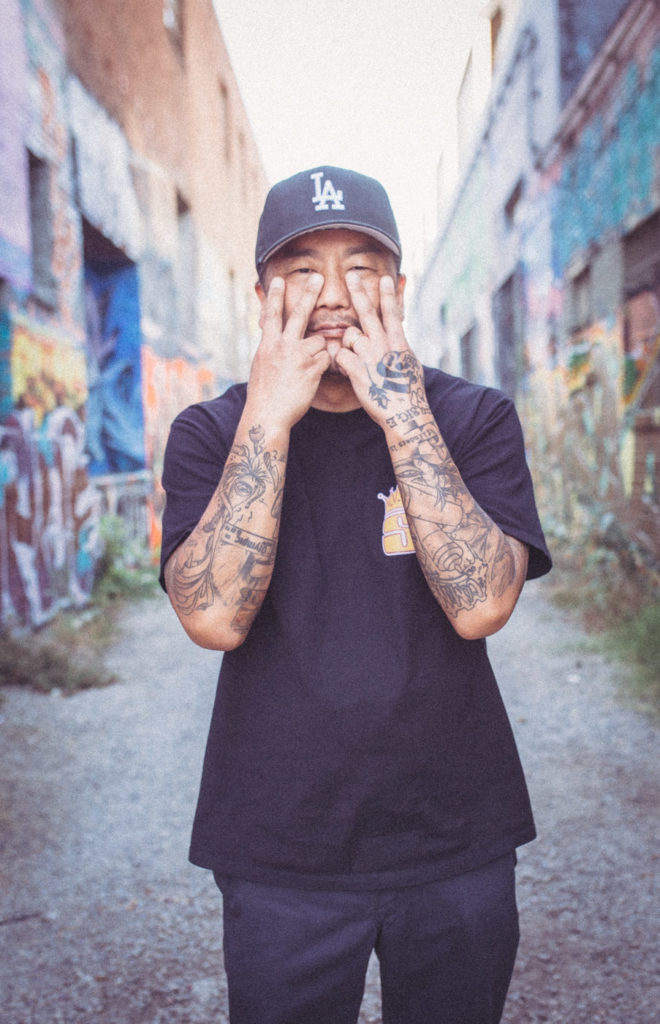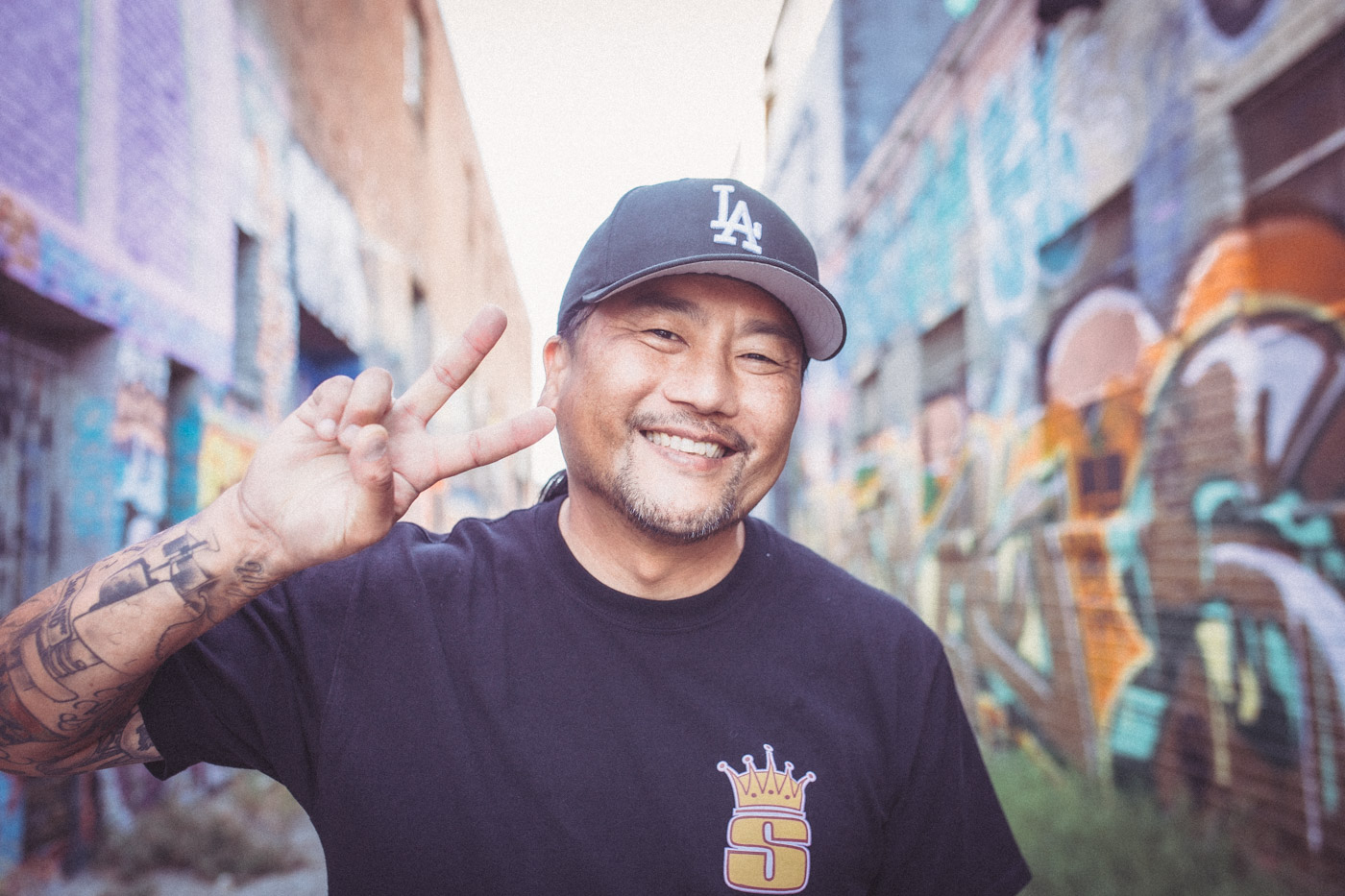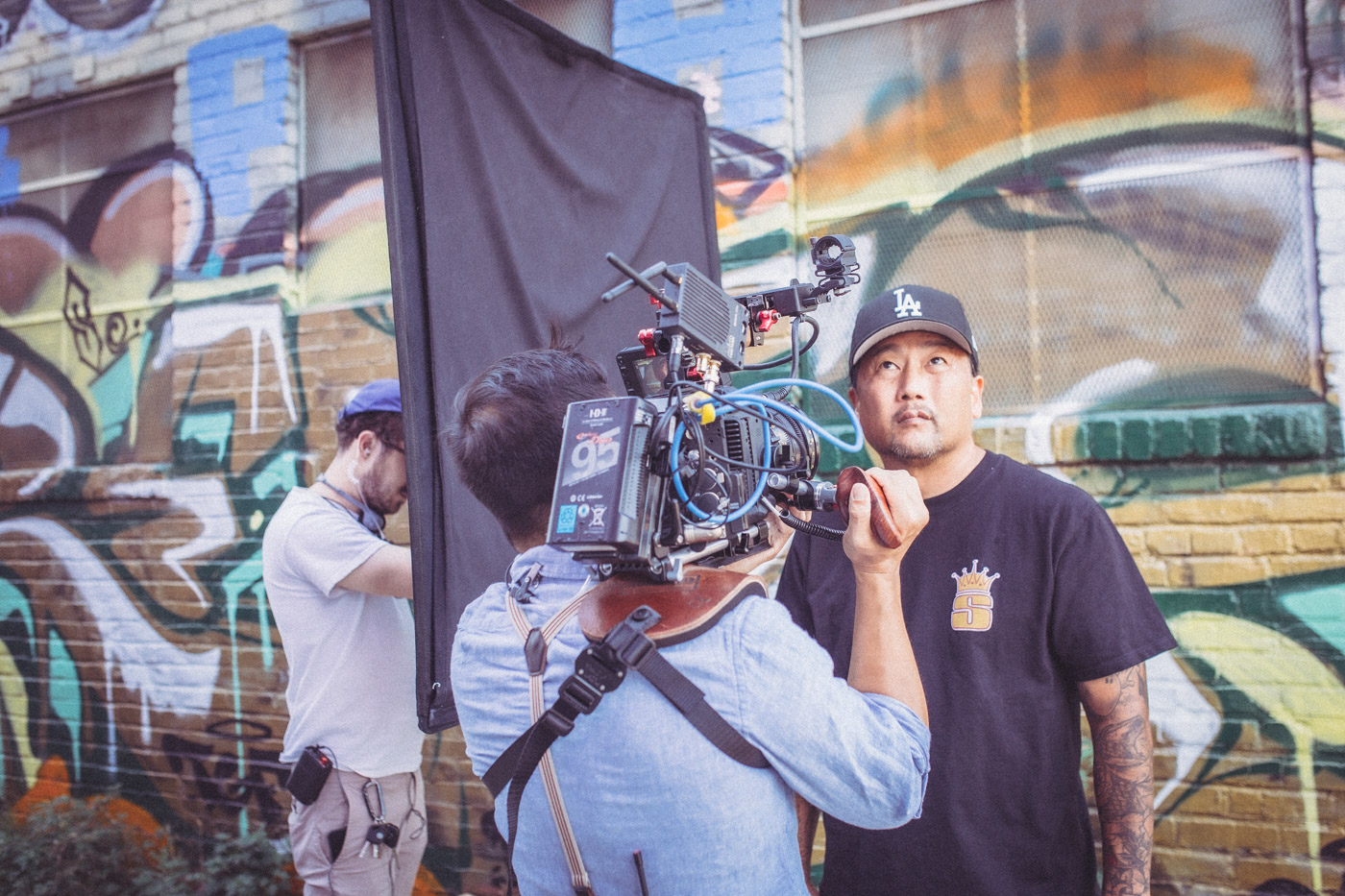Los Angeles — Feb 24, 2022
Roy Choi Has Nothing To Hide
Los Angeles chef and Broken Bread host Roy Choi shares how the series helped him yield to important lessons after operating in a neighborhood where longtime residents can no longer afford to live.
By Lisa Kwon
Photography by Antonio Diaz

“There will be nothing like the ‘70s again in this world,” chef and Broken Bread* host Roy Choi says as he reflects on Downtown Los Angeles when he was a child. He hits a stride while talking about riding buses at four years old and driving cars by nine.
“What was so beautiful and a little bit deranged is there were no safety measures anywhere … but back then, you were just left alone,” he recounts. “Kids with no seatbelts sitting on top of the roofs while the car was moving—that shit was like a movie.”
Being a latchkey kid in the wild and unfettered ‘70s empowered Choi to wander anywhere he wanted. He especially loved Chinatown. While his parents worked long hours in the Jewelry District, he roamed the neighborhood and got lost in his imagination. He smiles fondly thinking about Bruce Lee posters, poultry markets, and doctors with signs in Chinese and Spanish. He remembers the almond cookies, chow mein and egg rolls too, of course.
“Going to Chinatown felt like your own portal,” says Choi. He felt safe being where he could see others who looked like him and eat food that tasted familiar. With romantic memories for the neighborhood to where he would escape, Choi loved the idea of returning to Chinatown with his rice bowl shop, Chego, in 2013. What he didn’t realize was that making a choice rooted in nostalgia blinded him to how he would change the neighborhood.
—
Considered a pioneer of the L.A. food truck scene, Choi became the standard bearer of food innovation in the city. Each one of his joint ventures or restaurant openings has been hotly followed by food explorers and media, the latter of whom are quick to draft storylines of his uncanny ability to know who, what or where will be the “next big thing.” As a result, Broken Bread, a show that explores social justice issues using food, becomes interesting when its host opens himself up to criticism despite being one of the most acclaimed and likable chefs in American gastronomy.
Although Choi emphasizes Broken Bread is not your typical food show, its “From Seed To Table” episode about food sovereignty and cultivating second-generation seeds is arguably the most food-driven episode. Choi yields to Shiku’s vibrant plates of Korean vegetables, breaking out into the Cabbage Patch dance after a bite of Chef Kwang Uh’s pan-fried kimchi and corn mixture wrapped in perilla leaves. Choi wants Broken Bread to be about more than just food, but he cannot deny himself the unbridled joy of connecting through his language. Allowing himself to be playful brings levity to the issues that Broken Bread covers.

For the show’s second season, Choi initially wanted to set out to the South to document the roots of why America experiences unequal food distribution systems. After living in Atlanta, Georgia, and Roanoke, Virginia, Choi felt passionate about covering the slave trade, the route of rice in the Carolinas, and the racism baked into the Sun Belt. But before he could set off to shoot, the Covid-19 pandemic shut down all plans for travel. As his team went back to the drawing board, Choi realized he could focus on food sovereignty and biodiversity in his home state. In fact, there were some personal loops he could close about the roles he has played in these issues.
With a social footprint of almost 600,000 followers, Choi asked people who they would like to see interviewed on the show. The most riveting conversations from this crowd-sourced effort are those where Choi is challenged with the truths before him. After he soothes his jitters from being in front of one of his idols, he sits quietly before Chuck D as the Public Enemy member and activist goes long on how the lack of access to food in Black neighborhoods is a deliberate move by the American machine to displace Black people.
Similarly, in his trek to Boyle Heights, Choi is engrossed in conversation with actor and playwright Richard Montoya, who talks about the forceful evictions of Mexican American landowners in Chavez Ravine to make room for a proposed public housing project. History would eventually show that in a series of politically motivated events, the city of Los Angeles scrapped original plans and cleared the land for Walter O’ Malley’s Brooklyn Dodgers to build their new stadium. With solemnity, Choi says, “We don’t get taught any of that stuff in school—none of that.” For a season that originally was going to take place elsewhere, remaining in his home state allowed for deeper reckonings of following one’s pursuit on stolen lands.
—
When Chego opened in 2013, hawk-eyed food media followed his movements, glamorizing Chinatown as an up-and-coming area for real estate. Even without this personal experience, Choi knew Broken Bread had to cover gentrification. From Inglewood to Boyle Heights, Los Angeles’ working-class neighborhoods are becoming the most expensive places to live in America, yet few outlets are adequately covering the players behind “revitalization” and how well-heeled Angelenos are displacing their working-class or low-income neighbors. Choi decided an episode could use his own narrative in it.
“I woke up one day and I decided to offer the team my own personal story,” says Choi. “I have nothing to hide and I’m willing to confront any mistakes I’ve ever made, so we offered everything that had happened from that opening.”
Ever the avid learner, Choi recites back what he learned from activists and legacy businesses about gentrification. While shooting the episode, he spent time walking up and down North Broadway with Sissy Trinh, Executive Director of Southeast Asian Community Alliance, an organization helping Southeast Asian communities build power through education and advocacy.
Choi says it himself: Trinh “schooled” him on what happened to Chinatown when everyone got wind of Chego’s momentum. In an effort to capitalize on the neighborhood’s growing popularity, landlords adopted a range of harassment tactics, such as shutting off water, to push tenants out. Developers broke ground with luxury apartment buildings, asking for upwards of $4,000 per month for rent. Choi laments that elderly residents lost their laundromats, grocery stores and caretaker services in favor of new “revitalization” projects.
For this episode, Choi also speaks with Jack Benchakul, owner of Endorffeine Coffee Bar in Far East Plaza, the contentious site where Chego operated until 2019. Benchakul talks about looking all throughout the city before setting up shop. “We wanted a space we could feel safe in and, … in my gut, felt like home,” he says.

Safety and belonging are common criteria for business owners of Asian descent, not just to avoid racism and violence, but also to avoid feeling singled out and tokenized for their offerings and identities. However, what doesn’t get discussed in this episode in detail is the plaza itself—its landlord, George Yu, is locally infamous for his discriminatory positioning against unhoused and working-class Angelenos who have lived in Chinatown for many years. With gentrification, who or what guarantees a safe home for one group of renters can also bring stress and harm to others.
Choi expresses regret that property owners and developers who discriminate against the poor and elderly do not get written about often. As someone who has the means to move into his preferred parts of town, he also wants to ask: Who accelerates gentrification aside from the powers that be? And notably, can one still be a gentrifier if they grew up in or near that now-changing neighborhood?
“That question was the head of the snake,” says Choi. “For example, say I grew up in Koreatown, my parents owned a shop in Koreatown for three generations, but then they’re too old to take care of it and it becomes a dying store. I take it over and turn it into a third-wave-whatever, it revitalizes the block, and brings in a whole new clientele. Then am I a gentrifier? It’s a very complicated question, but in many ways, you are.”
Like Benchakul’s decision to move to Chinatown, Choi’s choice for Chego felt right in his gut. That was his stomping ground through his adolescence. He thought he did all the right things to be in the good graces of 2013-era Chinatown: he rented out a simple 800-square-foot spot, devised affordable rice bowls under $10, sourced produce and paper goods from neighboring stores, and wrote his menus in Chinese, Vietnamese and Spanish.
“I thought I could bring some sincerity and love and humility to it all,” says Choi. “I’m saying these things not to defend my case, because I put it all out there on the show. It still wasn’t good enough. It was still a harmful endeavor for elderly residents who got pushed out.”
Choi leaves Broken Bread’s second season with a few ideas for how businesses and consumers can mitigate the effects of gentrification. The suggestions are quite simple for any newcomer: hire from within, share profits, and develop a surcharge for purchases to go toward funding an oversight committee for the neighborhood.
No two areas ask for the same. As an activist, Choi stresses the importance of listening to longtime residents, on-the-ground organizers, and other activists (his “kindred spirits,” as he refers to them) who assert their respective needs for community-driven development. No matter how any gentrifying neighborhood grows, for Choi, the bottom line is that nobody can claim ignorance anymore as entrepreneurs, consumers and all-around Angelenos.
“Sometimes, in life, it’s not about what you think is good,” says Choi. “You have to go beyond that. You have to be willing to confront it.”
Choi delivers a second season of Broken Bread where he shows up to conversations with an imagination for solutions instead of defending what he tried. Choi’s ‘70s sounded like a wild ride, but as it turns out: speed limits are a good thing.
*Broken Bread is directed by Life & Thyme’s Founder Antonio Diaz.


Our comments section is for members only.
Join today to gain exclusive access.